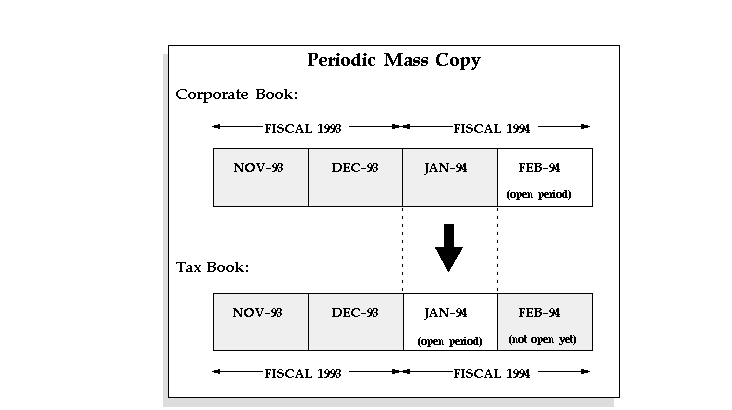| Previous | Next | Contents | Index | Navigation | Glossary | Library |
Oracle Assets copies new assets and transactions you made in your corporate book during one accounting period in the current fiscal year into the open period of your tax book. You can run periodic mass copy on each tax book after you close each period in the corporate book. The following graphic illustrates the Periodic Mass Copy process. In the following example, your fiscal year is from January to December. Your corporate book open accounting period is February 1994 and your tax book open period is January 1994.

Note: You can use Periodic Mass Copy to populate a new tax book if you added all your assets to your corporate book in the period for which you are running Mass Copy.
Periodic Mass Copy copies all qualifying transactions for an asset one at a time. It does not combine transactions, and only copies transactions from a closed accounting period in the associated corporate book.
Since tax books share the category and assignments with their associated corporate book, you do not need to copy reclassifications or transfers from your corporate book to your tax books. Tax books also share production information with their associated corporate book for your units of production assets. Periodic Mass Copy does not copy any transactions on CIP assets or expensed items. Finally, it does not copy revaluations.
When you use the same calendar in both the tax and the corporate book, Periodic Mass Copy copies asset transactions into your tax book just as they appear in your corporate book. If two transactions that fall into separate corporate periods fall into the same tax period, Periodic Mass Copy may copy the transactions differently.
The corporate book period must be closed before you can copy the information to your tax book. The Book Controls window displays the last mass copy period that you copied for that tax book.
If you add an asset in one period and adjust it several times in the following period in your corporate book, and these two periods fall into the same tax book period, Oracle Assets modifies the transactions in your tax book. Oracle Assets changes the addition transaction and all the adjustments, except the last one, to addition/void transactions. The last adjustment transaction in the corporate book becomes the addition transaction in the tax book.
When your tax book period spans several corporate book periods, and you add an asset and then retire the asset in the same tax book period, Oracle Assets copies the addition transaction but not the retirement transaction. If the retirement transaction is a partial retirement, Oracle Assets skips any following transactions for the asset. This is because Oracle Assets does not allow an addition and a retirement in the same period. You must wait until the following period in your tax book and perform a prior period retirement manually.
Continuing with the above example, if you retire the asset in your corporate book in the third month of the quarter, Oracle Assets does not copy the retirement transaction when you run Periodic Mass Copy for the third month.
Oracle Assets copies other adjustments from your corporate book to your tax book if you check Copy Adjustments in the Book Controls window. Oracle Assets copies all adjustments, whether your tax book periods are the same as your corporate book periods or longer. It only copies cost adjustments if the unrevalued cost before the adjustment in the corporate book and the unrevalued cost in the tax book are the same. It copies both adjustments that are ADJUSTMENT type in the tax book and adjustment transactions that create a new ADDITION type and update the ADDITION/VOID in the tax book.
Oracle Assets copies salvage value adjustments if you chose Copy Salvage Value in the Book Controls window. It only copies adjustments if the salvage value before the adjustment in the corporate book and the current salvage value in the tax book are the same.
Oracle Assets does not allow partial unit retirements in tax books, so Oracle Assets translates partial unit retirements in the corporate book into partial cost retirements for your tax books.
For partial cost retirements, if the asset cost is not the same in the two books, Oracle Assets retires an amount from the tax book that is proportional to the cost retired in the corporate book, using this formula:
Tax Cost Retired = (Corporate Cost Retired / Total Corporate Cost) X Total Tax Cost
Oracle Assets copies full retirements, even when the cost is different in the tax book. If you have fully retired an asset in your tax book, Oracle Assets does not copy over any more transactions for the asset, unless you reinstate it.
Oracle Assets copies reinstatement transactions into your tax book, unless you already performed the reinstatement in your tax book.
Oracle Assets treats a retirement in your tax book as prior period only if the asset's retirement date is before the first day of the current tax book accounting period.
Updating a Tax Book with Assets and Transactions
| Previous | Next | Contents | Index | Navigation | Glossary | Library |